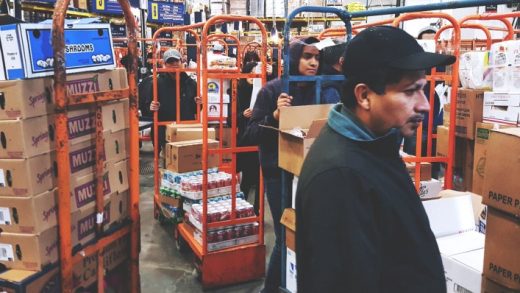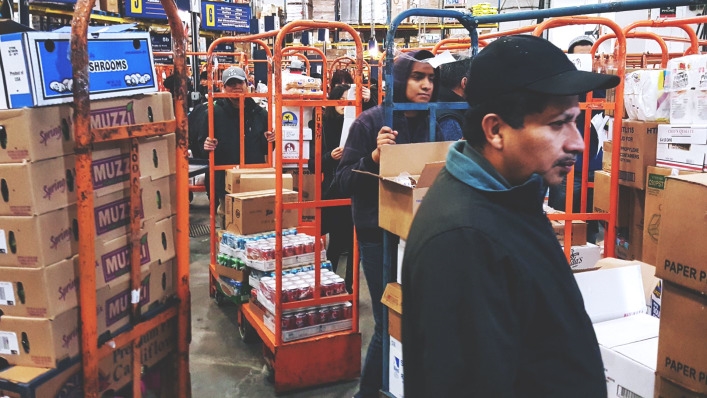These Latino Startup Founders Want To Use Technology To Save The Bodega
Growing up in the Bronx as the son of Latino immigrants, Julian Rodriguez spent a lot of time at bodegas. They represented much more than places to pick up an empanada or a sandwich after school. For one thing, his uncle owned one, so the store literally supported members of his family. “You’re going to get a very visceral reaction when you say the word ‘bodega’ to Latinos, particularly in New York,” Rodriguez tells Fast Company. “It is the cornerstone of the community. It’s not just a place or an object, it ties people who live in an area together.”
Rodriguez has built a career in the tech industry. He’s worked as a developer, headed a company that helps equip people with tech skills, and is a member of the Bitcoin Foundation, which helps create awareness about the cryptocurrency. But a year and a half ago, he decided he wanted to use his digital skills to help modernize an industry close to his heart: the corner store.
“We’d worked in several companies where we had made other people money,” Rodriguez says. “We thought, let’s do something for the people we grew up around. It was either the bodega owner or taxi drivers–and Uber and Lyft had taken over the taxi industry, so we hunkered down to help small business owners.”
In April, Rodriguez founded a tech platform called Access Bazaar with Yasser Toruno. The technology helps bodegas access better prices on goods, manage their inventory and finances, and even deliver products to stores. It’s a marketplace, much like Amazon, that is specifically targeted to the bodega or any other local restaurant or small business dealing with similar challenges.
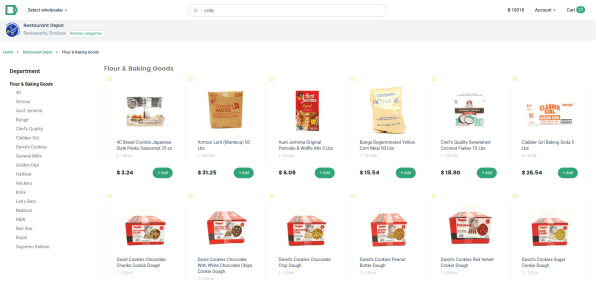
There are several other platforms on the market that also help small businesses restock, including SevenFifty, which focuses on bars, and Orderly, which works with restaurants. Access Bazaar is the only one that specifically caters to bodegas.
In the six months since it launched, Rodriguez says demand for the service has been so high—up to around 75 businesses, with many more hoping to join—that keeping up with all the daily deliveries can be a struggle. With $1 million in seed capital so far from Gotham Gal, Brooklyn Bridge Ventures, and Lattice Ventures, the company is now planning to expand its model to cities beyond New York.
Rodriguez, whose parents immigrated from the Dominican Republic, attributes the immediate interest to the fact that the founders are embedded in the community they are trying to serve, and are able to make the case that this is a valuable service to bodega owners. Contrast that with the approach of a Bay Area startup that launched this week called Bodega, founded by two former Google executives with no connection to the Latin American community. The company created little unmanned pantry boxes that would be situated in apartments, dorms, and gyms, aimed at eliminating the need to visit a corner store.
The startup spurred widespread criticism on social media from people who felt, among other things, that the founders had appropriated a Hispanic term for something that bore no resemblance to a real bodega, and was also designed to put those bodegas out of business. The company’s cofounders apologized for the anger they caused, noting that when branding their company, they “may not have been asking the right questions of the right people.”
Rodriguez’s idea for Access Bazaar came out of the realization that bodegas often get exploited by suppliers, paying prices that are much higher than market price. There are about a hundred bodega wholesalers, some of which have enormous warehouses on the outskirts of New York in places like Hunts Point in the Bronx and Gowanas in New Jersey. One big one is Jetro Restaurant Depot, which has locations around the city.
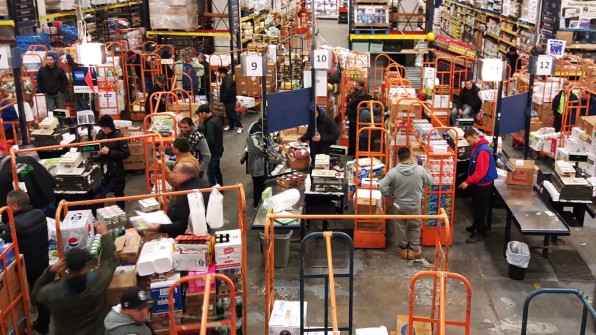
Whenever a bodega needs to restock their shelves, which could be daily, they drive their minivan or truck to these locations and buy products with cash. According to Rodriguez, the average bodega spends around $5,000 a week on inventory. It’s inconvenient and requires a lot of fluid capital.
But Rodriguez was particularly troubled by the fact that these bodegas are often not paying fair prices for these products. Since bodegas are so small, they don’t have the power to dictate lower prices, so they pay what they are asked. Bigger restaurant and bodega chains are able to negotiate lower prices, but the owner of a single bodega doesn’t have the same leverage.
“If you’re a recent immigrant looking to start a bodega, you need to figure out what your best option is,” Rodriguez says. “They tend to hold on to one distributer and hope he doesn’t screw them over. This is why Asian markets will buy from other Asian suppliers because they believe that someone from their own community will treat them fairly.”
As Rodriguez has observed, they are often not paying fair prices. “They’re marking up the products, they are charging delivery fees,” Rodriguez says. “It’s what happens when you’re in a totally opaque industry. The bodegas have no recourse and no purchasing power.”
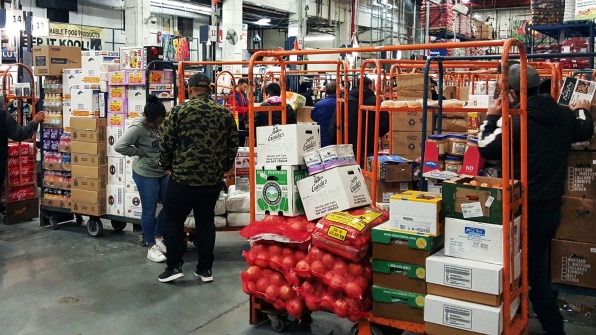
Every day, Rodriguez is tracking things like the fruit or meat markets in New York, then comparing them to what the wholesalers are charging. The markups can be very high. A wholesaler might be paying $13 for a crate of oranges that just came off a ship, then charging the bodega $40 for that crate. “The food industry is actually heavily regulated and the USDA is publicly reporting information all the time,” he says. “A store owner doesn’t have the time to look through it.”
With Access Bazaar, Rodriguez brokers deals with wholesalers on behalf of all the bodegas who use the system. The bodegas can log in and see all the products are listed and organized in a digitized way, with fluctuating prices. Owners can order what they need, then have products delivered the next day. This allows them to get better prices than they would otherwise get and also not have to deal with the ordeal of driving to get the products themselves.
But there are other important benefits of a system like this. Owners can plan better, based on real-time supply and demand in their stores. They can charge purchases to credit cards, rather than paying in cash. Ultimately, this means they can better plan their finances, rather than living from day to day.
Hopes For “A Bodega Renaissance”
Rodriguez says the system’s features were designed by working very closely with the city’s bodegas to understand their very specific needs. The founders spent eight months working on the platform by talking to bodega owners, creating prototypes and tweaking them based on their feedback.
“Being from this community–and going to speak to bodega owners–allows us to know what the pain points really are,” Rodriguez says. “Everything that our platform does was dictated by them. They told us what it is they wanted.”
Part of the uproar over Bodega, the Bay Area startup, was that it threatened, nonchalantly, to put real bodegas, along with other mom-and-pop corner stores, out of business. But Rodriguez laughed this off, pointing out that bodegas have been facing far more serious struggles over the last few years, with fiercer competition from Amazon and grocery delivery services like Fresh Direct and Instacart. They’ve also had to deal with escalating rents.
Still, he doesn’t think bodegas are at risk of going away, especially if they are able to evolve and become more efficient with modern technology. “This does not usurp or take the role of the business owner,” Rodriguez says. “These are tools that empower them. We would love to see a bodega renaissance in New York City.”
Fast Company , Read Full Story
(37)

